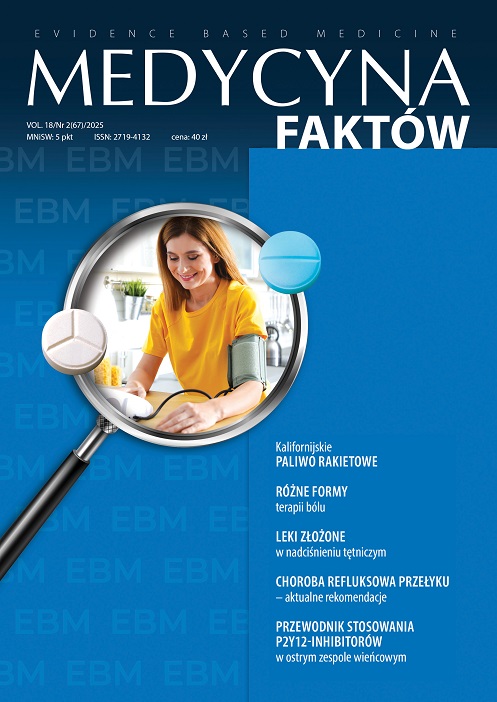Profiles of patients who may benefit from pregabalin therapy Case report
Main Article Content
Abstract
Pregabalin is a medication that acts on calcium channels in the nervous system and exhibits anxiolytic, analgesic, and anticonvulsant effects. Unlike benzodiazepines, it does not cause addiction or sedation, and its therapeutic effect occurs rapidly – often within a few days. It is approved for the treatment of epilepsy, neuropathic pain, and generalized anxiety disorder (GAD). Pregabalin is particularly effective in patients with somatic symptoms of anxiety, insomnia, chronic pain, or after alcohol detoxification. It is well tolerated in older adults and does not cause significant drug interactions. Its dosage should be adjusted based on renal function. Pregabalin is a valuable alternative or adjunct therapy for patients in whom SSRIs/SNRIs are ineffective or poorly tolerated.
Article Details
Copyright © by Medical Education. All rights reserved.
References
2. Baldwin DS, Ajel K, Masdrakis VG. Pregabalin for the treatment of generalized anxiety disorder: a novel pharmacologic option for treatment-resistant anxiety. CNS Spectr. 2007; 12(3): 192-8.
3. Frampton JE. Pregabalin: A review of its use in adults with generalized anxiety disorder. CNS Drugs. 2014; 28(9): 835-54.
4. Feltner DE, Crockatt JG, Dubovsky SJ et al. A randomized, double-blind, placebo-controlled, fixed-dose, multicenter study of pregabalin in patients with generalized anxiety disorder. J Clin Psychopharmacol. 2003; 23(3): 240-9.
5. Montgomery SA, Tobias K, Zornberg GL et al. Efficacy and safety of pregabalin in the treatment of generalized anxiety disorder: a 6-week, multicenter, randomized, double-blind, placebo-controlled comparison of pregabalin and venlafaxine. J Clin Psychiatry. 2006; 67(5): 771-82.
6. European Medicines Agency. Lyrica – Summary of Product Characteristics.
7. Bandelow B, Reitt M, Röver C et al. Efficacy of treatments for anxiety disorders: a meta-analysis. Int Clin Psychopharmacol. 2015; 30(4): 183-92.
8. Bockbrader HN, Radulovic LL, Posvar EL et al. Clinical pharmacokinetics of pregabalin in healthy subjects. J Clin Pharmacol. 2010; 50(8): 941-50.
9. Lydiard B, Rickels K, Herman B, Feltner DE. Comparative efficacy of pregabalin and benzodiazepines in treating the psychic and somatic symptoms of generalized anxiety disorder. Int J Neuropsychopharmacology 2010; 13(2): 229-241. https://doi.org/10.1017/S1461145709990460.
10. Montgomery S, Chatamra K, Pauer L, Whalen E, Baldinetti F. Efficacy and safety of pregabalin in elderly people with generalised anxiety disorder. Br J Psychiatry. 2008; 193(5): 389-394. http://doi.org/10.1192/bjp.bp.107.037788.
11. Förg A, Hein J, Volkmar K, Winter M, Richter C, Heinz A, Müller CA. Efficacy and Safety of Pregabalin in the Treatment of Alcohol Withdrawal Syndrome: A Randomized Placebo-Controlled Trial, Alcohol and Alcoholism 2012; 47(2): 149-155. https://doi.org/10.1093/alcalc/agr153.
12. Guglielmo R, Martinotti G, Clerici M, Janiri L. Pregabalin for alcohol dependence: a critical review of the literature. Adv Ther. 2012; 29(11): 947-57. http://doi.org/10.1007/s12325-012-0061-5.
13. Martinotti G, di Nicola M, Frustaci A et al. Pregabalin, tiapride and lorazepam in alcohol withdrawal syndrome: a multi-centre, randomized, single-blind comparison trial. Addiction. 2010; 105(2): 288-99. http://doi.org/10.1111/j.1360-0443.2009.02792.x.

